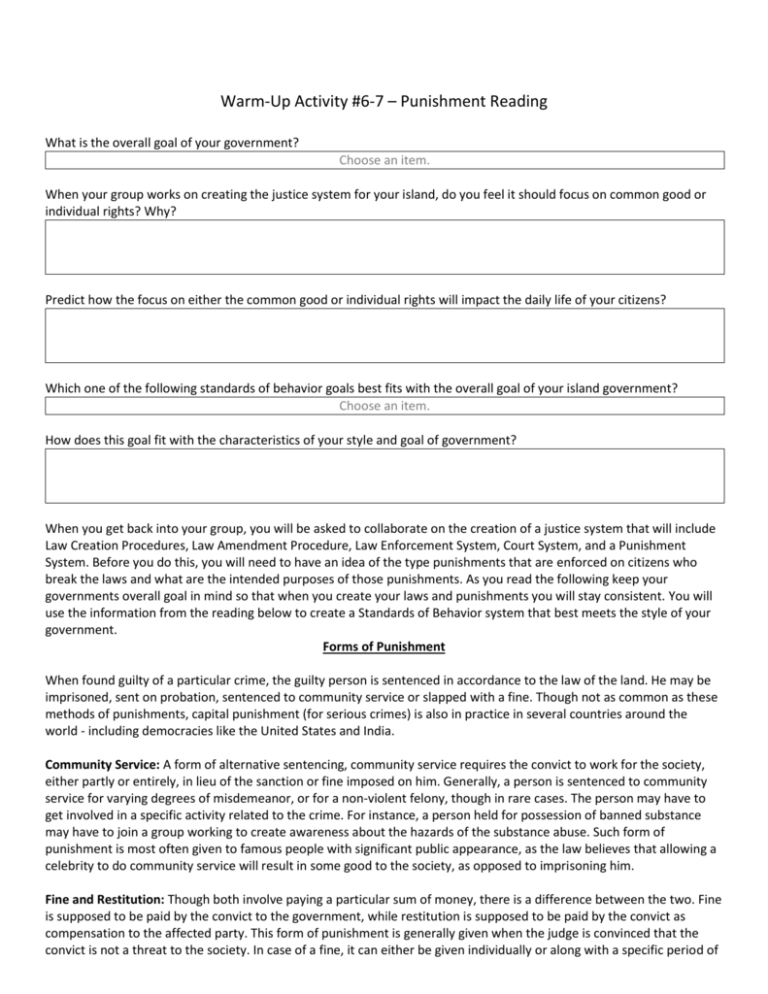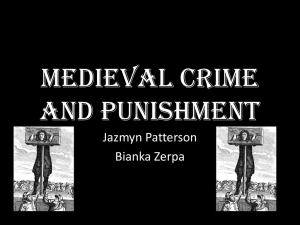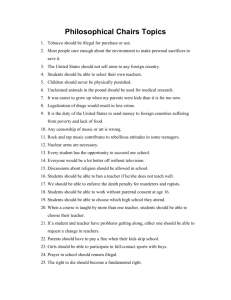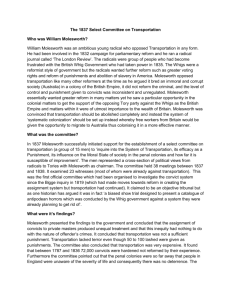Warm-Up Activity #6-7 - Punishment Reading
advertisement

Warm-Up Activity #6-7 – Punishment Reading What is the overall goal of your government? Choose an item. When your group works on creating the justice system for your island, do you feel it should focus on common good or individual rights? Why? Predict how the focus on either the common good or individual rights will impact the daily life of your citizens? Which one of the following standards of behavior goals best fits with the overall goal of your island government? Choose an item. How does this goal fit with the characteristics of your style and goal of government? When you get back into your group, you will be asked to collaborate on the creation of a justice system that will include Law Creation Procedures, Law Amendment Procedure, Law Enforcement System, Court System, and a Punishment System. Before you do this, you will need to have an idea of the type punishments that are enforced on citizens who break the laws and what are the intended purposes of those punishments. As you read the following keep your governments overall goal in mind so that when you create your laws and punishments you will stay consistent. You will use the information from the reading below to create a Standards of Behavior system that best meets the style of your government. Forms of Punishment When found guilty of a particular crime, the guilty person is sentenced in accordance to the law of the land. He may be imprisoned, sent on probation, sentenced to community service or slapped with a fine. Though not as common as these methods of punishments, capital punishment (for serious crimes) is also in practice in several countries around the world - including democracies like the United States and India. Community Service: A form of alternative sentencing, community service requires the convict to work for the society, either partly or entirely, in lieu of the sanction or fine imposed on him. Generally, a person is sentenced to community service for varying degrees of misdemeanor, or for a non-violent felony, though in rare cases. The person may have to get involved in a specific activity related to the crime. For instance, a person held for possession of banned substance may have to join a group working to create awareness about the hazards of the substance abuse. Such form of punishment is most often given to famous people with significant public appearance, as the law believes that allowing a celebrity to do community service will result in some good to the society, as opposed to imprisoning him. Fine and Restitution: Though both involve paying a particular sum of money, there is a difference between the two. Fine is supposed to be paid by the convict to the government, while restitution is supposed to be paid by the convict as compensation to the affected party. This form of punishment is generally given when the judge is convinced that the convict is not a threat to the society. In case of a fine, it can either be given individually or along with a specific period of imprisonment. If required, the court can also confiscate the property of the convict, especially when the crime is serious and the person convicted is in no position of paying the fine. Probation: Yet another widely used form of punishment, probation is most often used in lieu of imprisonment. A person is sentenced to probation for misdemeanors as well as a felony of a lesser degree. In some cases the convict may have to spend a part of his sentence in the prison. The person on probation is supposed to abide by the probation conditions set by the court. For instance, he is restricted from possessing weapons or moving out of the area of jurisdiction. The probation officer is assigned the task to ensure that the person is follows these probation rules properly. If required, the court can change its orders, and send the convict back to the prison. Imprisonment: Imprisonment or incarceration, wherein the person is put in jail as a lawful punishment, is perhaps one of the most common punishments in the world. Retribution, i.e. the act of correcting a person for his misconduct, is the main purpose of imprisonment. But this also serves other purposes like deterrence, incapacitation and rehabilitation. The term, or the period, that the convict has to spend in the prison depends on several factors, most prominent ones being the area of jurisdiction and severity of the crime. Even though it is the most common form of punishment, even imprisonment has been subjected to intense criticism as a result of incidents wherein people falsely accused of a crime had to spend life terms in prison. Capital Punishment: Capital punishment, also referred to as the death penalty, is one of the most severe forms of punishment. A person may be sentenced to death penalty for crimes like murder, homicide, rape, etc., depending on the provisions in the law of the land. The most important objectives of capital punishment are deterrence - conveying a message that such acts will not be tolerated in the society, and incapacitation - making sure that the person doesn't repeat such heinous actions. The different methods used to carry out death penalty executions today include hanging, electrocution, lethal injection, and firing squad. Inclusion of capital punishment as a part of the judicial process has been a subject of debate since quite some time now. While some argue that it is absolutely immoral act on the part of the system, others feel it is necessary to establish a crime free society. The type of punishment chosen usually has to do with correcting a behavior. The purpose of the punishment can vary based on the crime, repeat offences, and the type of leadership in control. The following are the different reasons for punishing criminals: - Repentance: to make the criminal feel bad about his crime - Retribution: to ensure justice to the victim and their family - Deterrence: to set an example for the rest of the society - Incapacitation: to prevent the criminal from repeating the criminal actions - Rehabilitation: to help the criminal learn to behave correctly, so they can rejoin society. Which style of punishment do you foresee your island government enforcing the most? Choose an item. How does this form of punishment best meet the style of government for your island?









